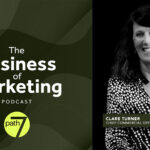By Will Burghes, Head of Marketing Science, and Alan Stout, Head of Strategy, ARGONAUT
Creativity is facing a crisis, brought on by the growing power of persuasion, the anonymous and overwhelmingly negative public forum available on social media and the rise and promise of targeted, performance-driven media.
This crisis was on full display when Coinbase CEO Brian Armstrong touted the brand’s simple, yet effective and creative Super Bowl ad, tweeting “No agency would have done this ad.”
I was excited to see Martin Agency CEO Kristen Cavallo stand up in defense of creativity, saying Armstrong’s tweet “easily could have been a celebration of creativity and breakthrough thinking versus claiming credit and disregarding agencies.”
The Unintended Consequences of Persuasion
As marketers, we work in service of the power of persuasion. It shouldn’t come as a surprise, then, that persuasion can have some unintended consequences.
Consider the “nocebo effect” – the lesser known but no less powerful, cousin of the placebo effect. The nocebo effect manifests when people think — or, are convinced — that a harmless pill is in fact doing them harm. They become so convinced that they experience genuine negative side effects (in response to a sugar pill).
This particular brand of persuasive power is probably also how curses work. If a person believes they’re cursed, they can be genuinely harmed. For example, the legend of King Tutankhamun’s curse resurfaced in the 1970s, when a flight that was carrying treasures from his tomb reportedly resulted in health problems for many people involved for years to come.
Marketers are often focused on how persuasion affects the consumers we’re targeting. But it’s time to look inward and consider the effects – and unintended consequences – it’s having on our industry.
What Caused the Crisis in Creativity?
In 2019, Les Binet and Peter Field famously wrote about a “crisis in creativity.” Their analysis showed that the creativity at the heart of the advertising industry was slowly collapsing as the world pushed more into digital, performance-driven media. Perfect targeting promised financial results with limited creative thought and without the hassle of building a brand or coherent strategy.
While they could be correct, there is an alternate theory. Binet and Field suggest that the creativity collapse began in 2008. This would be a few years after Web 2.0 fully emerged and people began to take advantage of the ability to anonymously – and often negatively – comment on others’ work.
We see this in forums and websites devoted to our industry. In the past, Adweek’s Agency Spy enabled comments on posts and they were often filled with insults and invective. Just recently, in Advertising Fishbowl, someone with the handle Senior Art Director wrote, in part: “If you let this ad die now, that will be the end of it. I will not look for you, I will not pursue you. But if you don’t, I will look for you, I will find you.” In another, a commenter wrote: “Who’s making Nissan commercials? Makes me wanna sell my Nissan (if I had one). Unfriend all my friends who own Nissan.”
What do these anonymous sniping and veiled threats accomplish? It has a corrosive effect not only on individuals but on our industry as a whole.
Why We Need an Industry-Wide Reckoning
Advertising has always been a subjective industry where successful careers are made by having better intuition and taste than those around you. The Internet has enabled those in the industry to render verdicts on others’ work with remarkable speed and frequency.
It’s easy to imagine what having your work trashed by hordes of commenters in an anonymous forum could do to your creative output, not to mention your motivation and passion. Very few humans are capable of performing at their best while being told their output is worthless. Creative people are people, after all.
How Every Marketer Can Make a Difference
So, what can be done?
First, maybe we should all ditch the negative commentary when it comes to other people’s work. No one starts their day intending to make a terrible ad. If we were all judged solely on the worst campaign we were involved with, very few of our portfolios would look good.
Second, maybe we should all be cheerleaders for one another sometimes. When was the last time you publicly praised a competing agency for their work? When the Instagram account of a major creative agency praises the work of another in the comments, things will start looking up.
If, as Binet and Field suggest, creativity is an endangered art, we should all be fighting together to protect it. Putting one another down is only making matters worse. We don’t need to let harmless scenarios create harmful side effects. We don’t need to allow curse-like fears to hinder the dreamers of our industry. Marketers are all creative people, so let’s act like we truly care about creativity.






